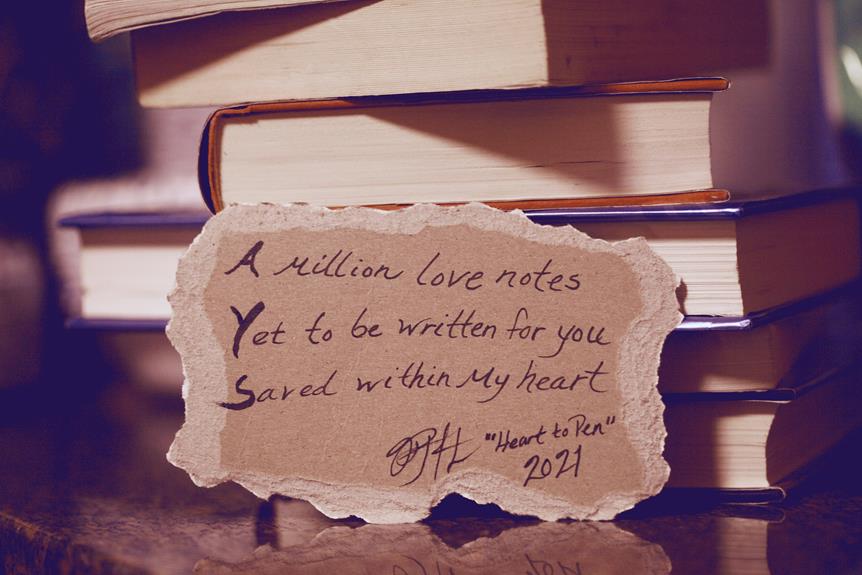
You'll recognize some of the most iconic opening lines in literature, like 'Call Me Ishmael' from 'Moby Dick,' setting the tone for a thrilling seafaring adventure and an intimate story. 'It Was the Best of Times, It Was the Worst of Times' from 'A Tale of Two Cities' masterfully contrasts hope and despair amid the French Revolution's backdrop. Tolstoy's 'Anna Karenina' starts with 'Happy Families Are All Alike; Every Unhappy Family Is Unhappy in Its Own Way,' exploring the dynamics of joy and sorrow within families. Finally, 'Peter Pan' with 'All Children, Except One, Grow Up' delves into themes of innocence, eternal youth, and societal expectations.
These lines are just the beginning of the rich worlds these books offer.
Opening Line: "Call Me Ishmael"
When delving into the iconic opening line 'Call Me Ishmael,' one instantly feels the beckoning pull of Melville's timeless tale. The simplicity of these three words carries a weight that sets the stage for the epic journey that's 'Moby Dick.' By directly addressing the reader, the narrator establishes a sense of intimacy, drawing you into the narrative from the very start.
As you continue reading, the significance of this opening line deepens. It not only introduces the character Ishmael but also hints at themes of identity, friendship, and the relentless pursuit of the unknown. Through these words, you're invited to join Ishmael on his seafaring adventure, filled with danger, obsession, and the enigmatic white whale that haunts Captain Ahab.
Opening Line: "It Was the Best of Times, It Was the Worst of Times"
In the midst of contrasting extremes lies the captivating opening line: 'It Was the Best of Times, It Was the Worst of Times.' This iconic phrase from Charles Dickens' novel 'A Tale of Two Cities' immediately sets the tone for a story filled with both hope and despair, joy and sorrow.
The juxtaposition of 'the best of times' and 'the worst of times' creates a powerful sense of duality, drawing you into a narrative that explores the complexities of human experience. The opening line hints at the turbulent historical backdrop of the French Revolution, where moments of great prosperity and happiness coexist with profound suffering and tragedy.
As you read these words, you're invited to reflect on the unpredictable nature of life itself, where moments of triumph can quickly give way to moments of adversity. Dickens' masterful use of language in this opening line serves as a poignant reminder of the fragile balance between light and darkness, joy and sorrow, that defines the human condition.
Opening Line: "Happy Families Are All Alike; Every Unhappy Family Is Unhappy in Its Own Way"
Each happy family resembles one another, while every unhappy family possesses its unique brand of misery. This iconic opening line from Leo Tolstoy's novel 'Anna Karenina' immediately sets the tone for a story filled with contrasting emotions and complexities within family dynamics. The simplicity of the statement belies the depth of insight it offers into the human experience.
Tolstoy suggests that happiness is a common thread among content families, highlighting the similarities in their joyous existence. On the other hand, the diversity of unhappiness within troubled families speaks to the myriad ways in which sorrow can manifest itself. This dichotomy captures the essence of the novel, where characters navigate the intricacies of love, betrayal, and societal expectations.
As the narrative unfolds, readers are drawn into the intricate web of relationships and emotions that define each family's unique struggles. Tolstoy's timeless exploration of happiness and unhappiness resonates with audiences across generations, making this opening line a lasting symbol of literary brilliance.
Opening Line: "All Children, Except One, Grow Up"
Navigating the complexities of family dynamics, another iconic opening line in literature introduces the idea that while most children grow up, there's one exception to this universal truth: 'All Children, Except One, Grow Up.' This captivating line comes from J.M. Barrie's beloved tale, 'Peter Pan.'
By stating that all children, except for one, undergo the inevitable process of growing up, Barrie immediately sets the stage for a narrative that delves into the themes of childhood innocence, escapism, and the passage of time.
The notion of a child who defies the norm by refusing to grow up sparks curiosity and invites readers to ponder the significance of retaining a childlike wonder and imagination even in the face of adulthood. Through this opening line, Barrie prompts us to explore the concept of eternal youth and the bittersweet reality of leaving behind the carefree days of childhood.
As you delve into the enchanting world of 'Peter Pan,' you're compelled to question what it truly means to grow up and whether holding onto a childlike spirit is a form of rebellion against societal expectations.
Conclusion
So, there you have it – some of the most iconic opening lines in literature that have stood the test of time.
These lines not only draw readers in but also set the tone for the entire story that follows.
Whether it's the call of the sea, the contrast of good and bad times, the complexities of family dynamics, or the allure of never growing up, these opening lines continue to captivate readers across generations.




